古希腊罗马神话故事选读Roman Mythology第一课
- 格式:pptx
- 大小:5.78 MB
- 文档页数:27
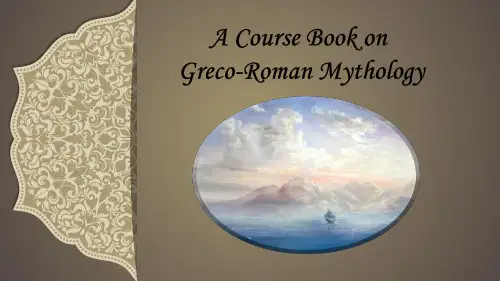


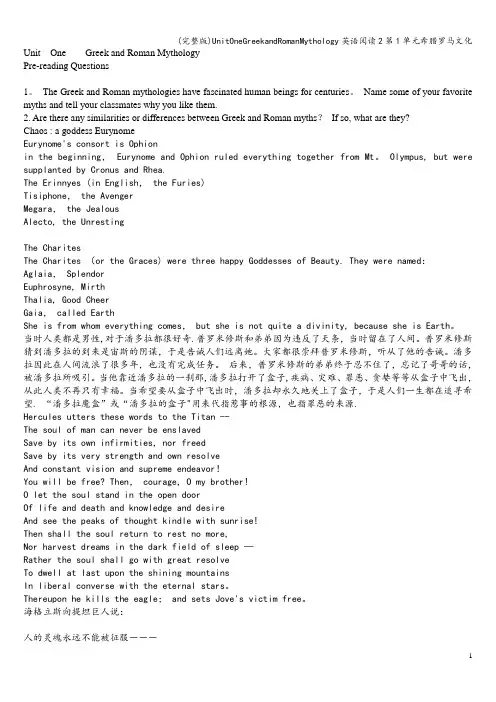
Unit One Greek and Roman MythologyPre-reading Questions1。
The Greek and Roman mythologies have fascinated human beings for centuries。
Name some of your favorite myths and tell your classmates why you like them.2. Are there any similarities or differences between Greek and Roman myths?If so, what are they?Chaos : a goddess EurynomeEurynome's consort is Ophionin the beginning, Eurynome and Ophion ruled everything together from Mt。
Olympus, but were supplanted by Cronus and Rhea.The Erinnyes (in English, the Furies)Tisiphone, the AvengerMegara, the JealousAlecto, the UnrestingThe CharitesThe Charites (or the Graces) were three happy Goddesses of Beauty. They were named:Aglaia, SplendorEuphrosyne, MirthThalia, Good CheerGaia, called EarthShe is from whom everything comes, but she is not quite a divinity, because she is Earth。
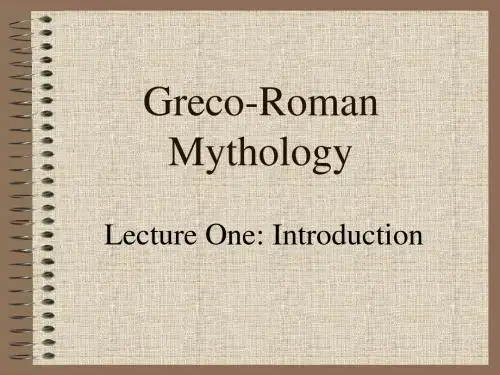
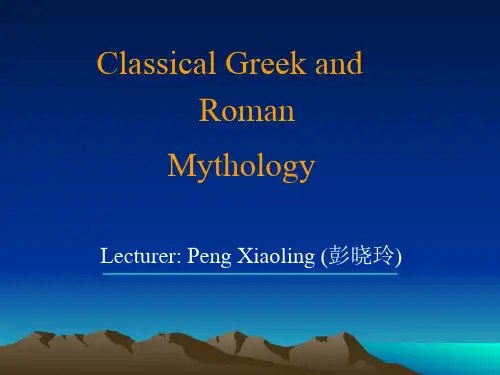
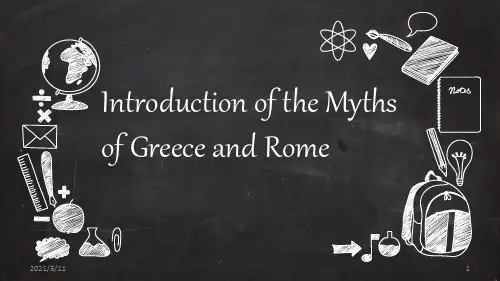
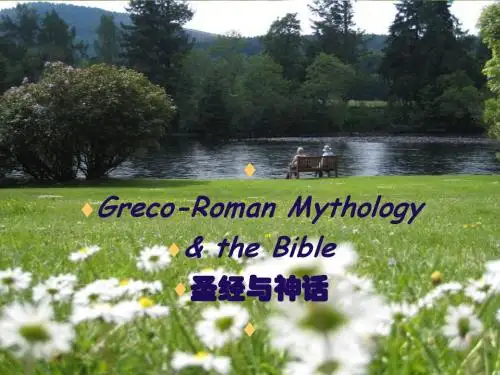

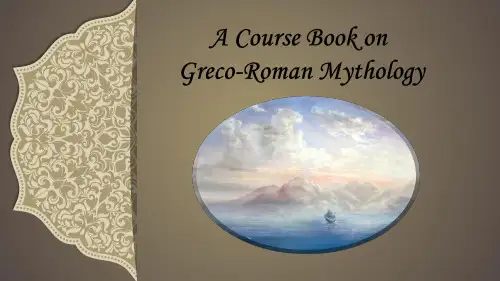
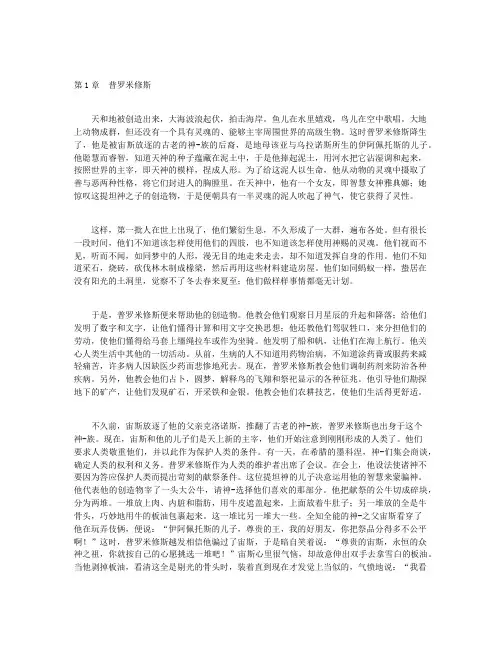
第1章普罗米修斯天和地被创造出来,大海波浪起伏,拍击海岸。
鱼儿在水里嬉戏,鸟儿在空中歌唱。
大地上动物成群,但还没有一个具有灵魂的、能够主宰周围世界的高级生物。
这时普罗米修斯降生了,他是被宙斯放逐的古老的神-族的后裔,是地母该亚与乌拉诺斯所生的伊阿佩托斯的儿子。
他聪慧而睿智,知道天神的种子蕴藏在泥土中,于是他捧起泥土,用河水把它沾湿调和起来,按照世界的主宰,即天神的模样,捏成人形。
为了给这泥人以生命,他从动物的灵魂中摄取了善与恶两种性格,将它们封进人的胸膛里。
在天神中,他有一个女友,即智慧女神雅典娜;她惊叹这提坦神之子的创造物,于是便朝具有一半灵魂的泥人吹起了神气,使它获得了灵性。
这样,第一批人在世上出现了,他们繁衍生息,不久形成了一大群,遍布各处。
但有很长一段时间,他们不知道该怎样使用他们的四肢,也不知道该怎样使用神赐的灵魂。
他们视而不见,听而不闻,如同梦中的人形,漫无目的地走来走去,却不知道发挥自身的作用。
他们不知道采石,烧砖,砍伐林木制成椽梁,然后再用这些材料建造房屋。
他们如同蚂蚁一样,蛰居在没有阳光的土洞里,觉察不了冬去春来夏至;他们做样样事情都毫无计划。
于是,普罗米修斯便来帮助他的创造物。
他教会他们观察日月星辰的升起和降落;给他们发明了数字和文字,让他们懂得计算和用文字交换思想;他还教他们驾驭牲口,来分担他们的劳动,使他们懂得给马套上缰绳拉车或作为坐骑。
他发明了船和帆,让他们在海上航行。
他关心人类生活中其他的一切活动。
从前,生病的人不知道用药物治病,不知道涂药膏或服药来减轻痛苦,许多病人因缺医少药而悲惨地死去。
现在,普罗米修斯教会他们调制药剂来防治各种疾病。
另外,他教会他们占卜,圆梦,解释鸟的飞翔和祭祀显示的各种征兆。
他引导他们勘探地下的矿产,让他们发现矿石,开采铁和金银。
他教会他们农耕技艺,使他们生活得更舒适。
不久前,宙斯放逐了他的父亲克洛诺斯,推翻了古老的神-族,普罗米修斯也出身于这个神-族。
Roman and Greek Mythology希腊罗马神话课程教案Foreign Language Teaching and Research DepartmentHeilongjiang UniversityForeign Language Teaching and Research Department★ Introduction of GreeceI.ObjectivesStudents will be able to :1. get to know something about GreeceII.Lesson PlanGreece is the southeasternmost region on the European continent. It is defined by a series of mountains, surrounded on all sides except the north by water, and endowed with countless large and small islands. The Ionian (爱奥尼亚) and Aegean seas and the many deep bays and natural harbors along the coastlines allowed the Greeks to prosper in maritime commerce(海上贸易)and to develop a culture which drew inspiration from many sources, both foreign and indigenous. Greece has a history stretching back almost 4000 years. The people of the mainland, called Hellenes(古希腊人), organised great naval and military expeditions, and explored the Mediterranean and the Black Sea, going as far as the Atlantic Ocean and the Caucasus Mountains(高加索山脉). One of those expeditions, the siege of Troy, is narrated in the first great European literary work, Homer's Iliad. During the Classical period (5th century B.C.), Greece was composed of city-states(古希腊的城邦), the largest being Athens, followed by Sparta(斯巴达)and Thebes(底比斯). In the second half of the 4th century B.C., the Greeks, led by Alexander the Great①, conquered most of the then known world and sought to Hellenize it. In 146 BC Greece fell to the Romans.During the Hellenistic period, the Greek world was reaching as far east as India. At length its culture became one of the oldest and the most resplendent ancient civilizations in history---Hellenic culture. From this moment on, I will do my best to present you the culture from mythology stories.Foreign Language Teaching and Research DepartmentChapter1 IntroductionI. ObjectivesStudents will be able to :1. get to know the Beginning of the World2. get to know the Olympian GodsII. Learning Difficultiesdifferent names of the gods and goddessesIII.Lesson Plan★ 1.1 The Beginning of the WorldBefore earth and sea and heavens became known, the face of nature was one crude, formless mass. Land and sea and air were mingled together. The universe was a uniform darkness, without sun, moon, let alone the earth. In the middle of the darkness sat Chaos and his wife---Nyx [niks], the goddess of Night, who reigned but did not rule. So the whole space was lifeless. Centuries later, with the birth of Light and Day, earth and sea and air came into being. And also Chaos and Nyx gave birth to Gaea 盖亚(Earth), and Gaea gave birth to Uranus (Heaven) and married him. Still later, the union of Gaea and Uranus gave birth to the Titans (The Titans of Greek mythology were the twelve children of Gaea and Uranus), the Cyclopes and the Centimani. Afraid that his own gigantic children might usurp his throne, Uranus drove them all back to the earth, and this roused the resentment of the mother Gaea. At her instigation one of her sons, Cronus (one Titan) attacked and wounded Uranus with a sickle given by Gaea. Thus Cronus got the crown and became the supreme ruler of the universe.He married his own sister Rhea and entrusted the management of the sun to his brother Hyperion and the moon to his sister Phoebe. Cronus ruled his realm peacefully until an oracle prophesied that he would one day be dethroned/overthrown by one of his own children. To avoid the disaster he took the excessive precaution of swallowing up all his five children one by one after their birth. These were Hesia The goddess of the hearth (赫斯提:女灶神) Demeter (The goddess of the harvest得墨忒耳:主管收获的女神), Hera, Poseidon (The god of the waters, earthquakes, and horses), Hades (The god of the netherworld). When Rhea bore the last child, Zeus (Jupiter), Cronus wanted to get rid of him in the same fashion. But the mother wrapped up a piece of stone in the infant’s swathes and handed it over to the unsuspecting father. Thus Zeus was saved and sent to Mt Ida (艾达峰:克里特岛中部一山峰), where the mountain nymphs (宁芙女神:以美丽女子形象出现,有时化身为树、水和山等自然之物的小女神) did all in their power to protect him from any harm. By the time Cronus became aware of the deception, it was too late, for young Zeus suddenly appeared before him and easily deposed/dethroned him.Foreign Language Teaching and Research DepartmentWith the help of a nauseous potion, Zeus forced his father to disgorge his five brothers and sisters. But Cronus and his Titans were not reconciled to their defeat. They made war on Zeus and his brothers and sisters. Acting on the advice of his mother Rhea, Zeus released the Cyclopes from under the earth and armed himself with their thunderbolts, for the Cyclopes were thunderbolt-makers. Soon Cronus and Titans were forced to submission and cast down into Tartarus (The regions below Hades where the Titans were confined塔尔塔罗斯:冥府下面的深渊). Thus Zeus became the ruler of the Olympus. He made his sister Hera his queen, and distributed power among his brothers and sisters and his sons and daughters. Among them, Poseidon ruled over the vast expanse of seas and oceans, and Pluto was assigned as the lord to the lower world.★ 1.2 The Olympian GodsOn Mt Olympus, the overlord of gods---Zeus---was not an autocrat; he led a council of twelve members (i.e. there were twelve major gods on Mt Olympus).There were twelve Olympians, although you may run across fourteen different names. Hestia, Demeter, Dionysus, and Hades are variable. The remaining ten are: Apollo, Ares, Hermes, Hephaestus, Poseidon, and Zeus, among the gods; Aphrodite, Athena, Artemis, and Hera, among the goddesses.Zeus(宙斯天王): Zeus is the ruler of the Olympian gods. He is also known as Jupiter in Roman. His attributes in iconography include the lightning bolt, the eagle, and the scepter. Hera(赫拉天后婚姻神): As the wife (and sister) of Zeus, Hera is the patron of marriage. She is also known as Juno (Roman). She has no unique attributes in iconography and so can only be identified by context or inscription.Poseidon(波塞冬海神): Poseidon is the god of the sea. He is also known as Neptune (Roman) and the Earth-shaker. His attributes in iconography include the trident and the fish.Hades(哈得斯冥神阎王):Hades is the god of the underworld. He is also known as Pluto(Roman). His attributes in iconography are the cornucopia and the sceptre.Ares(阿瑞斯战神): Ares is the god of war and conflict and is the husband of Aphrodite. He is also known as Mars (Roman). Ares is depicted as a warrior but, as he has no unique attributes in iconography, he can only be identified by context or inscription. Hephaestus (赫菲斯托斯火和锻冶之神) : The god of fire and metalworking.Hermes(赫耳墨斯商神幸运神): Hermes' main role is as a messenger but he has many other functions as well. He is also known as Mercury (Roman). His attributes in iconography include the kerykeion (messenger's staff), winged boots, and petassos (cap). Apollo(阿波罗太阳神): Apollo is associated principally with music, prophecy, sickness, and medicine. He is also known as Phoebus Apollo and is called the Far Shooter and the Pythian. (He has no separate Roman name.) His attributes in iconography are the cithara, or sometime the lyre, the bow, the fawn, and the tripod. He is often depicted with his sister, Artemis.Artemis(阿耳忒弥斯月神狩猎神): Artemis is the goddess of the hunt and animals, as well as of childbirth. She is also known as Diana (Roman). Her attributes in iconography include the bow and the fawn. She often appears with her brother, Apollo.Athene(雅典娜智慧神): Athene (also spelled Athena) is the patron of wisdom, military Foreign Language Teaching and Research Departmentvictory, and women's crafts. She is the one who leaped up from the top of Zeus’s head. She is also known as Tritogeneia and Minerva (Roman) and is also called Pallas Athene. Her attributes in iconography include the aegis (a fringed cloak, sometimes decorated with a Gorgon's head), the helmet, and the spear.Demeter(得墨忒耳农神): Demeter is the giver of grain. She is also known as Ceres (Roman) and sometimes Deo. Her attributes in iconography can include a torch, a crown, a sceptre, and stalks of grain. She is often portrayed with her daughter, Persephone/Kore. Aphrodite(阿芙罗蒂德爱欲之神): Aphrodite governs desire and sexuality. She is also known as Cytherea, Cypris, and Venus (Roman). She is often pictured with a sceptre or a mirror.Hestia The goddess of the hearth, daughter of Cronus and Rhea.(赫斯提:女灶神,克罗诺斯与瑞亚之女)Dionysus The god of wine and of an orgiastic religion celebrating the power and fertility of nature.Also called Bacchus狄俄尼索斯(酒神, 即罗马神话中的Bacchus)酒神和宗教狂欢庆祝大自然权力与丰产之神Gods assembled: In the line behind and from left to right is first Hades, holding his two-forked scepter, the mother of the gods Rhea 1, and between her and Hera is Hera's peacock. Zeus sits in the middle with the eagle at his feet holding the thunderbolt in his hand.To his right sits Cronos and standing are Athena and Apollo. Under the latter Artemis, with a half-moon adorning his head, is seen holding her bow. In the first line and from left to right Dionysus 2 is seen reclining. Ares in armour sits close to Aphrodite who looks at Eros as he comes towards her. In the far right sits Poseidon holding his trident.Foreign Language Teaching and Research DepartmentChapter2 Prometheus and Pandora's BoxI. ObjectivesStudents will be able to :1. get to know something about Prometheus2. get to know something about PandoraII. Learning DifficultiesThe relation between Prometheus and PandoraIII. Lesson Plan★ 2.1 PrometheusPrometheus was one of the Titans, a gigantic race, who inhabited the earth before the creation of man. Prometheus was called the benefactor of mankind.To him and his brother Epimetheus was committed the office of making man, and providing him and all other animals with the faculties necessary for their preservation. Epimetheus undertook to do this, and Prometheus was to overlook his work, when it was done. Epimetheus accordingly proceeded to bestow upon the different animals the various gifts of courage, strength, swiftness, sagacity; wings to one, claws to another, a shelly covering to a third, etc. But when man came to be provided for, who was to be superior to all other animals, Epimetheus had been so prodigal of his resources that he had nothing left to bestow upon him. In his perplexity he resorted to his brother Prometheus, who, with the aid of Minerva (The goddess of wisdom, invention, the arts, and martial prowess. 密涅瓦:掌管智慧、发明、艺术和武艺的女神), went up to heaven, and lighted his torch at the chariot of the sun. and brought down fire to man. With this gift man was more than a match for all other animals. It enabled him to make weapons wherewith to subdue them; tools with which to cultivate the earth; to warm his dwelling, so as to be comparatively independent of climate; and finally to introduce the arts and to coin money, the means of trade and commerce.Zeus sent most of the Titans to Tartarus to punish them for fighting against him in the Titanomachy, but since the second generation Titan Prometheus had not sided with his aunts, uncles, and brother Atlas, Zeus spared him. Zeus then assigned Prometheus the task of forming man from water and earth, which he did, but in the process, became fonder of men than Zeus had anticipated. Zeus didn't share Prometheus' feelings and wanted to keep men from having power, especially of fire. So Zeus deprived mankind of the gift of fire. Prometheus cared more for man than for the wrath of the increasingly powerful and autocratic king of the gods, so he stole fire from Zeus' lightning, concealed it in a hollow stalk of fennel, and brought it to man. He also stole skills from Hephaestus and Athena to give to man. Then, when Zeus and he were discussing the ceremonial forms for Foreign Language Teaching and Research Departmentanimal sacrifice, Prometheus devised a way to help man. He divided the slaughtered animal parts into two packets. In one was the ox meat and innards wrapped up in the stomach lining. In the other packet were the ox bones wrapped up in its own rich fat. Prometheus presented Zeus with a choice between the two, and Zeus took the richer appearing. As a result of this trick, man would thereafter be able to feast on the meat whenever it sacrificed (burned bones) to the gods.Prometheus was still not awed by the might of Zeus and continued to defy him, refusing to warn him of the dangers of the nymph Thetis (future mother of Achilles). Zeus had tried punishing Prometheus through his loved ones, but this time he decided to punish him more directly. He bade Hephaestus (or Hermes) chain Prometheus to Mount Caucasus, where an eagle ate his ever-regenerating liver each day.Eventually Hercules rescued Prometheus, and Zeus and the Titan were reconciled. ★ 2.2 Pandora’s BoxPandora, was crafted by Hephaestus in his forge. Athena provided Pandora with skills in the womanly arts and made her dangerous. Zeus, who ordered her creation, gave her as a gift and a curse to mankind. Thus Pandora can be said to have had three parents. Pandora is better known as the woman whose curiosity got the best of her when she opened the forbidden box out of which came all the evils of the world and one good, hope.Aphrodite (Venus) gave her beauty, Hermes (Mercury) persuasion, Apollo music, etc. Thus equipped, she was conveyed to earth, and presented to Epimetheus, who gladly accepted her, though cautioned by his brother to beware of Zeus and his gifts. When he was preoccupied with teaching men the art of living, Prometheus had left a big cask in the care of Ephimetheus. He had warned his brother not to open the lid. Pandora was seized with an eager curiosity to know what this jar contained; and one day she slipped off the cover and looked in. Forthwith there escaped a multitude of plagues and sickness, theft and violence, grief and sorrow and all the other evils that human world was henceforward to experience. Pandora hastened to replace the lid! But the whole contents of the jar had escaped, one thing only excepted, which lay at the bottom, and that was hope. So we see at this day, whatever evils are abroad, hope never entirely leaves us; and while we have that, no amount of other ills can make us completely wretched/miserable/despaired..Foreign Language Teaching and Research DepartmentChapter3 The Four Ages and The FloodI. ObjectivesStudents will be able to :1. get to know something about the four ages2. get to know something about the floodII. Learning DifficultiesThe two characters in the story of the floodIII. Lesson Plan★ 3.1 the Four AgesGolden AgeThe Golden Age was a mythical first period of man when everything was happy and easy, and mortals lived like gods, although they died, but only as if falling asleep. No one worked or grew unhappy. Spring never ended. It is even described as a period in which people aged backwards. When they died, they became ghosts and roamed the earth. The people of the Golden Age were formed by or for the titan Cronus.When Zeus overcame the titans the Golden Age ended.First of all the deathless gods who dwell on Olympus made a golden race of mortal men who lived in the time of Cronos when he was reigning in heaven. And they lived like gods without sorrow of heart, remote and free from toil and grief: miserable age rested not on them; but with legs and arms never failing they made merry with feasting beyond the reach of all evils. When they died, it was as though they were overcome with sleep, and they had all good things; for the fruitful earth unforced bare them fruit abundantly. They dwelt in ease and peace upon their lands with many good things, rich in flocks and loved by the blessed gods.Silver AgeDuring the Silver Age the Olympian god Zeus was in charge. Zeus caused this generation of man to be created inferior in appearance and wisdom to the last. He divided the year into four seasons. Man had to plant grain and seek shelter, but still, a child could play for a hundred years before growing up. The people wouldn't honor the gods, so Zeus caused them to be destroyed. When they died, they became "blessed spirits of the underworld."Bronze AgeThe third Age was of bronze. Zeus created men from ash trees. They were strong and warlike. They did not eat bread. Their armor and homes were of bronze. It was this generation of men that was destroyed by the flood in the time of Deucalion and Pyrrha. When they died they went to the Underworld.Foreign Language Teaching and Research DepartmentThese were destroyed by their own hands and passed to the dank house of chill Hades, and left no name: terrible though they were, black Death seized them, and they left the bright light of the sun.Our race is the Iron Race in the Iron Age.Iron AgeZeus placed a fourth race of men on earth during the present, Iron Age. All manner of evils came into being during this age. Piety and other virtues disappeared and most of the gods who were left on Earth, abandoned it. Zeus will destroy this race some day.The father will not agree with his children, nor the children with their father, nor guest with his host, nor comrade with comrade; nor will brother be dear to brother as aforetime. Men will dishonour their parents as they grow quickly old, and will carp at them, chiding them with bitter words, hard-hearted they, not knowing the fear of the gods. They will not repay their aged parents the cost their nurture, for might shall be their right: and one man will sack another's city. There will be no favour for the man who keeps his oath or for the just or for the good; but rather men will praise the evil-doer and his violent dealing. Strength will be right and reverence will cease to be; and the wicked will hurt the worthy man, speaking false words against him, and will swear an oath upon them. Envy, foul-mouthed, delighting in evil, with scowling face, will go along with wretched men one and all. And then Aidos and Nemesis (7), with their sweet forms wrapped in white robes, will go from the wide-pathed earth and forsake mankind to join the company of the deathless gods: and bitter sorrows will be left for mortal men, and there will be no help against evil.★ 3.2 The FloodTowards the end of the Age of Bronze the human world became very wicked. Men grew greed, and impious. Neither right nor law was respected any longer, and the rule of hospitality (殷勤待客的风俗) was forgotten. Disguised in human form, Zeus visited Arcadia (A region of ancient Greece in the Peloponnesus. Its inhabitants, relatively isolated from the rest of the known civilized world, proverbially lived a simple, pastoral life. 阿卡迪亚:古希腊的一区域,位于伯罗奔尼撒,其居民与其它著名文明世界相对隔绝,以过着简朴和田园式的生活著称。
希腊罗马神话欣赏APPRECIATION OF GREEK & ROMANMYTHOLOGY课程介绍•课程描述•课程要求•考查方式& 评分标准•课程内容•推荐读物课程描述—课程意义Francis Bacon(1561—1626)英国哲学家、科学家、作家“英国唯物主义和整个现代实验科学的真正始祖”----马克思Studies serve for delight, forornament, and for ability.Their chief use for delight, is inprivateness and retiring; forornament, is in discourse; and for ability, is in the judgment anddisposition of business.-----Of Studies读书足以怡情,足以博彩,足以长才。
其怡情也,最见于独处幽居之时;其博彩也,最见于高谈阔论之中;其长才也,最见于处世判事之际。
课程描述—课程意义西方文化的三个源头希腊罗马神话圣经文艺复兴/ 北欧神话/ 骑士精神Without certain knowledge of Greek and Roman mythology, one can never fully understand and appreciate western culture.课程描述—课程意义希腊罗马神话对西方文化的影响语言文学天文艺术社会生活语言Adonisas false as Cressidaprocrustean bedunder the aegis ofJupiter laughs at lovers ’perjuries.Far from Jupiter, far from thunder. Without Ceres and Bacchus, Venus grows cold.他是个陈世美桃园结义 说曹操,曹操到Shakespeare: Romeo and Juliet At lovers ’perjuries, they say Jove laughs文学Shakespeare (1564-1616) Troilus and Cressida(tragedy) Venus and Adonis(poem)文学Shelley (1792-1822) Prometheus UnboundHymn of ApolloHymn of PanAdonis文学KeatsEndymionOde to PsycheJames JoyceUlysses (Odyssey)George Bernard Shaw PygmalionSaturn: God of agriculture and father of Jupiter 天文天文Ursa Major天文Ursa Minor天文Lyra天文Hercules天文Orion艺术Da Vinci, 1506a 16 C. copy after a lost painting by Michelangelo ,1530 (National Gallery, London) Leda and the Swan艺术Leda and the SwanJacopo Carucci Pontormo 1512-13意大利佛罗伦萨乌斐兹美术馆大理石雕塑希腊古典时期其他Apollo ProgramPoseidon Submarine Trident I & II missile Trojan horse virus课程要求、考查方式& 评分标准要求分值评分标准Participation40%出勤& 课堂参与Test30%开卷/ 内容Paper30%单页稿纸;手写/ 题目考试内容1. 写出希腊罗马神话中十二大天神的名字,包括希腊文名字和拉丁文名字,并介绍他们的主要职责。
希腊神话第一课GreekMythologyTheogony–PartI神谱大耳朵特色授课室ID:2831时间:2014年1月5日 8:30——10:30授课老师:Lin老师授课内容:特色英语助教:婉音本课内容:希腊神话第一课Greek MythologyTheogony – Part I 神谱I.Introduction - theogonyThe Theogony (Greek: Θεογον?α, Theogonía, pronounced [t?eoɡonía], “the birth of the gods") is a poem by Hesiod (8th –7th century BC) describing the origins and genealogies of Greek polytheism, composed circa 700 BC. It is written in the Epic dialect of Homeric Greek.The versionTranslated by H.G. Eveyln-White in 1914Ⅱ. Table of contentsProemium: Hymn to the Muses of Helicon (1 - 104)Chaos and The First Gods (105 - 122)The Second Generation: Children of the First GodsChildren of NightChildren of GaiaThe Children of Night (part 2)The Line of PontosChildren of Pontos produced asexuallyChildren of Gaia and Pontos (237 - 239)Children of the Titans (337 - )Challenges to ZeusChildren of the Olympians (886 - )Goddesses who bore Children to Mortal Men (965 - 1020) Mortal Women who bore Children to Gods (1021 ff.: the Catalog of Women)Ⅲ. Part I – chaos and the first godsChaos: "Chasm" (116)Gaia or Gaea: "Earth" (116)Tartaros or Tartarus: “Abyss” (119)Eros: "Love" (120)Erebos or Erebus: "Gloom" (123)Nyx: "Night" (123)Ⅳ. ll. 116-138Verily at the first Chaos came to be, but next wide-bosomed Earth, the ever-sure foundations of all (4) the deathless ones who hold the peaks of snowy Olympus, and dim Tartarus in the depth of the wide-pathed Earth, and Eros (Love), fairest among the deathless gods, who unnerves the limbs and overcomes the mind and wise counsels of all gods and all men within them.From Chaos came forth Erebus and black Night; but of Night were born Aether (5) and Day, whom she conceived and bare from union in love with Erebus.(4) Earth, in the cosmology of Hesiod, is a disk surrounded by the river Oceanusand floating upon a waste of waters. It is called the foundation of all (thequalification …the deathless ones...? etc. is an interpolati on), because not only trees,men, and animals, but even the hills and seas (ll. 129, 131) are supported by it.(5) Aether is the bright, untainted upper atmosphere, as distinguished from Aer,the lower atmosphere of the earth.Ⅴ. ll. 116-138 – cont.And Earth first bare starry Heaven, equal to herself, to cover her on every side, and to be an ever-sure abiding-place for the blessed gods. And she brought forth long Hills, graceful haunts of the goddess-Nymphs who dwell amongst the glens of the hills. She bare also the fruitless deep with his raging swell, Pontus, without sweet union of love. But afterwards she lay with Heaven and bare deep-swirling Oceanus, Coeus and Crius and Hyperion and Iapetus, Theia and Rhea, Themis and Mnemosyne and gold-crowned Phoebe and lovely Tethys. After them was born Cronos the wily, youngest and most terrible of her children, and he hated his lusty sire.Ⅵ. ll. 139-146And again, she bare the Cyclopes, overbearing in spirit, Brontes, and Steropes and stubborn-hearted Arges (6), who gave Zeus the thunder and made the thunderbolt: in all else they were like the gods, but one eye only was set in themidst of their fore-heads. And they were surnamed Cyclopes (Orb-eyed) because one orbed eye was set in their foreheads. Strength and might and craft were in their works.(6) Brontes is the Thunderer; Steropes, the Lightener; and Arges, the Vivid One Ⅶ.ll. 147-163And again, three other sons were born of Earth and Heaven, great and doughty beyond telling, Cottus and Briareos and Gyes, presumptuous children. From their shoulders sprang an hundred arms, not to be approached, and each had fifty heads upon his shoulders on their strong limbs, and irresistible was the stubborn strength that was in their great forms. For of all the children that were born of Earth and Heaven, these were the most terrible, andthey were hated by their own father from the first.Ⅷ. ll. 147-163 – cont.And he used to hide them all away in a secret place of Earth so soon as each was born, and would not suffer them to come up into the light: and Heaven rejoiced in his evil doing. But vast Earth groaned within, being straitened, and she made the element of grey flint and shaped a great sickle, and told her plan to her dear sons. And she spoke, cheering them, while she was vexed in her dear heart:Ⅸ.Ll. 164-175(ll. 164-166) `My children, gotten of a sinful father, if you will obey me, we should punish the vile outrage of your father; for he first thought of doing shameful things.'(ll. 167-169) So she said; but fear seized them all, and none of them uttered a word. But great Cronos the wily took courage and answered his dear mother:(ll. 170-172) `Mother, I will undertake to do this deed, for I reverence not our father of evil name, for he first thought of doing shameful things.'(ll. 173-175) So he said: and vast Earth rejoiced greatly in spirit, and set and hid him in an ambush, and put in his hands a jagged sickle, and revealed to him the whole plot.Ⅹ. ll. 176-206And Heaven came, bringing on night and longing for love, and he lay about Earth spreading himself full upon her (7).Then the son from his ambush stretched forth his left hand and in his right took the great long sickle with jagged teeth, and swiftly lopped off his ownfather's members and cast them away to fall behind him. And not vainly did they fall from his hand; for all the bloody dropsthat gushed forth Earth received, and as the seasons moved round she bare the strong Erinyes and the great Giants with gleaming armour, holding long spears in their hands and the Nymphs whom they call Meliae (8) all over the boundless earth.(7) The myth accounts for the separation of Heaven and Earth. In Egyptiancosmology Nut (the Sky) is thrust and held apart from her brother Geb (the Earth)by their father Shu, who corresponds to the Greek Atlas.(8) Nymphs of the ash-trees, as Dryads are nymphs of the oak-trees. Cp. noteon "Works and Days", l. 145.Ⅺ. ll. 176-206 – cont.And so soon as he had cut off the members with flint and cast them from the land into the surging sea, they were swept away over the main a long time: anda white foam spread around them from the immortal flesh, and in it there grewa maiden. First she drew near holy Cythera, and from there, afterwards, shecame to sea-girt Cyprus, and came forth an awful and lovely goddess, and grass grew up about her beneath her shapely feet. Her gods and men call Aphrodite, and the foam-born goddess and rich-crowned Cytherea, because she grew amid the foam, and Cytherea because she reached Cythera, and Cyprogenes because she was born in billowy Cyprus, and Philommedes (9) because sprang from the members. And with her went Eros, and comely Desire followed her at her birth at the first and as she went into the assembly of the gods. This honour she has from the beginning, and this is the portion allotted to her amongstmen and undying gods, -- the whisperings of maidens and smiles and deceits with sweet delight and love and graciousness.(9) `Member-loving': the title is perhaps only a perversion of the regularPHILOMEIDES (laughter-loving).The end~。